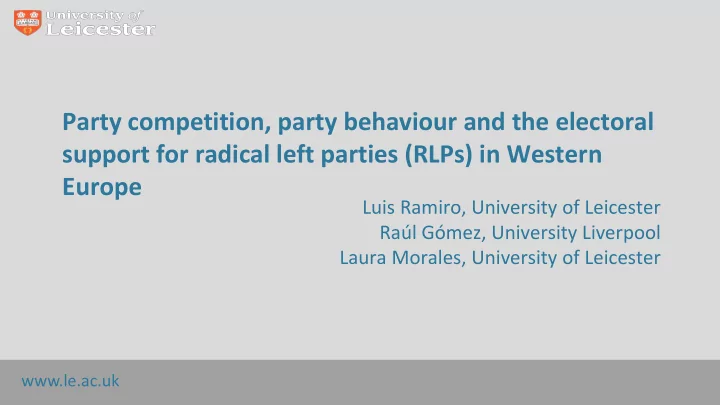

Party competition, party behaviour and the electoral support for radical left parties (RLPs) in Western Europe Luis Ramiro, University of Leicester Raúl Gómez, University Liverpool Laura Morales, University of Leicester www.le.ac.uk
Goal • Examine role of: – party competition, – party strategies and – internal party factors in explaining the cross-national and over-time differences in the vote for RLPs in Western Europe
Why should we be interested in RLP voting? RLPs constant relevance in West European party systems ‒ Electoral decline almost general until end of 1990s ‒ But West European radical left was always relatively diverse and the electoral evolutions of these parties also differed ‒ RLPs have experienced moderate growth since 2000s, heterogeneous electoral trajectories, and since the 2007-2008 economic crisis some parties show significant electoral gains
Yet… • Limited academic attention to RLP voting from a comparative, cross- national or longitudinal perspective • Some previous work on voters’ profiles but considerable gap in knowledge about party related factors shaping the vote for RLPs in Western Europe
Our contribution: • We study effects of competition dynamics, party strategies and party behaviour on RLP voting from a comparative, cross-national or longitudinal perspective • We focus on: - (i) spatial competition along the left-right divide, - (ii) strategic decisions about government participation, and - (iii) party unity
What is the role of parties’ and party competition factors in shaping the electoral support for RLPs in Western Europe? Theory • Party agency; • Niche parties’ performance is very dependent upon mainstream parties ’ strategies ( Meguid 2007); • Niche parties tend to move less along the competition dimensions, and their moves receive significantly less electoral reward (‘ Costly Policy Moderation Hypothesis’ by Adams et al . 2006)
Expectations 1. The Importance of Space and Strategic Moves • If left-to-centre space occupied by larger Social-Democrat and/or Green parties likelihood of voting for RLPs will diminish ( Spatial Availability Hypotheses ) • Whenever Social Democrats and Greens hold positions closer to left end of ideological space propensity to vote for RLPs will diminish ( Radicalized Competitor Hypotheses ) • When Social Democrat and Green parties choose to stress some of the most traditional left-wing issues RLPs will attract less voters ( Selective Left Issues Emphasis Hypotheses)
2. Other Aspects of Party Strategy and Behaviour: Government Participation and Internal Unity • When Social Democrats and Greens participate in government RLPs will be the electoral beneficiaries of voters’ disappointment ( Beneficial Competitor Incumbent Hypotheses ) • On the other hand, if RLPs are partners in a government likely to harm their electoral prospects ( Costly Government Participation Hypothesis) • Acute internal strife will decrease likelihood of voting for RLPs ( Internal Conflict Penalty Hypothesis)
Data and methodology • Period: Since the worst moment of their electoral decline (2 nd half of 1980s) to the most recent period (2014) • Cases from 13 countries where RLPs have had parliamentary representation (National or European parliament elections) • Data sources: – All waves of the European Election Studies: 1989, 1994, 1999, 2004, 2009 and 2014 – Comparative Manifesto Project data – Expert surveys on party positions – Secondary sources on party conflict and other sources
• Dependent Variable: voted for a RLP in previous national legislative election • Independent variables – Size of Social Democrats and Green competitors: % votes gained in the prior national elections – Parties ’ strategic behavior/left-right position of RLPs, Greens and Social Democrats: using a series of expert surveys – Emphasis given by different parties to traditional left-wing issues: using data from the Comparative Manifesto Project (CMP) – RLPs, Greens and Social Democrats participation in government: dichotomous variable – Internal party conflict variable
• Multi-level logistic regression models: controlling for survey year, time elapsed between national elections and survey, and system-level and voters’ sociodemographics and political attitudes
Preliminary Findings • Spatial Availability Hypotheses : RLP voting less likely where/when other left- wing competitors are large • Radicalized Competitor Hypotheses : only mixed support in the data; RLPs voting increases when Social Democrat parties are closer to the right, BUT when/where the Greens are moderate voting for RLP is lower • Selective Left Issues Emphasis Hypotheses: support for RLPs significantly decreases when either the Social Democrats or the Greens stress traditional left-wing issues
• Beneficial Competitor Incumbent Hypothesis: No support; there is no significant effect arising from either the Social Democrats or the Green’s being incumbents • Costly Government Participation Hypotheses: voters are significantly less likely to support RLPs after they participate in government. • Internal Conflict Penalty Hypothesis: voters tend to punish RLPs which have recently suffered from splits
Recommend
More recommend